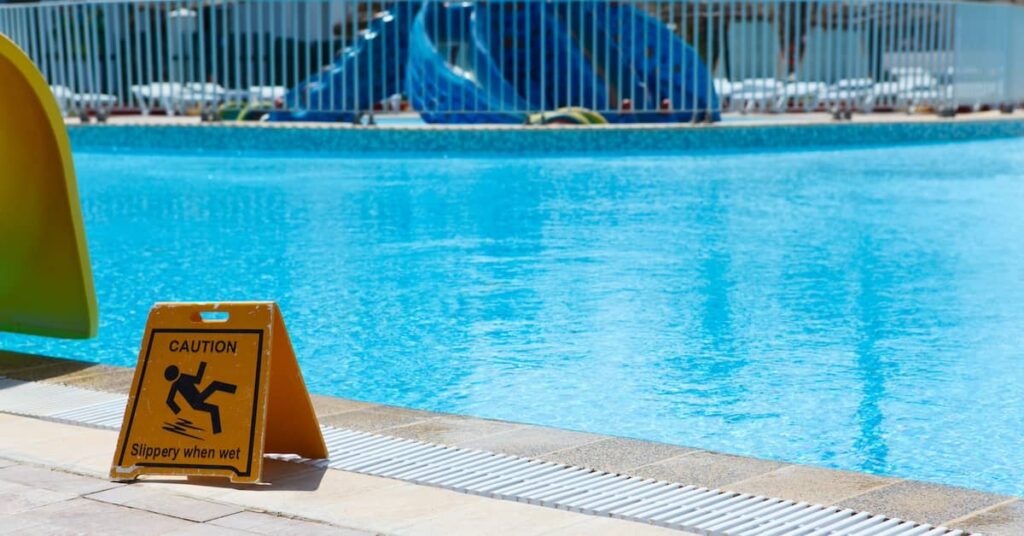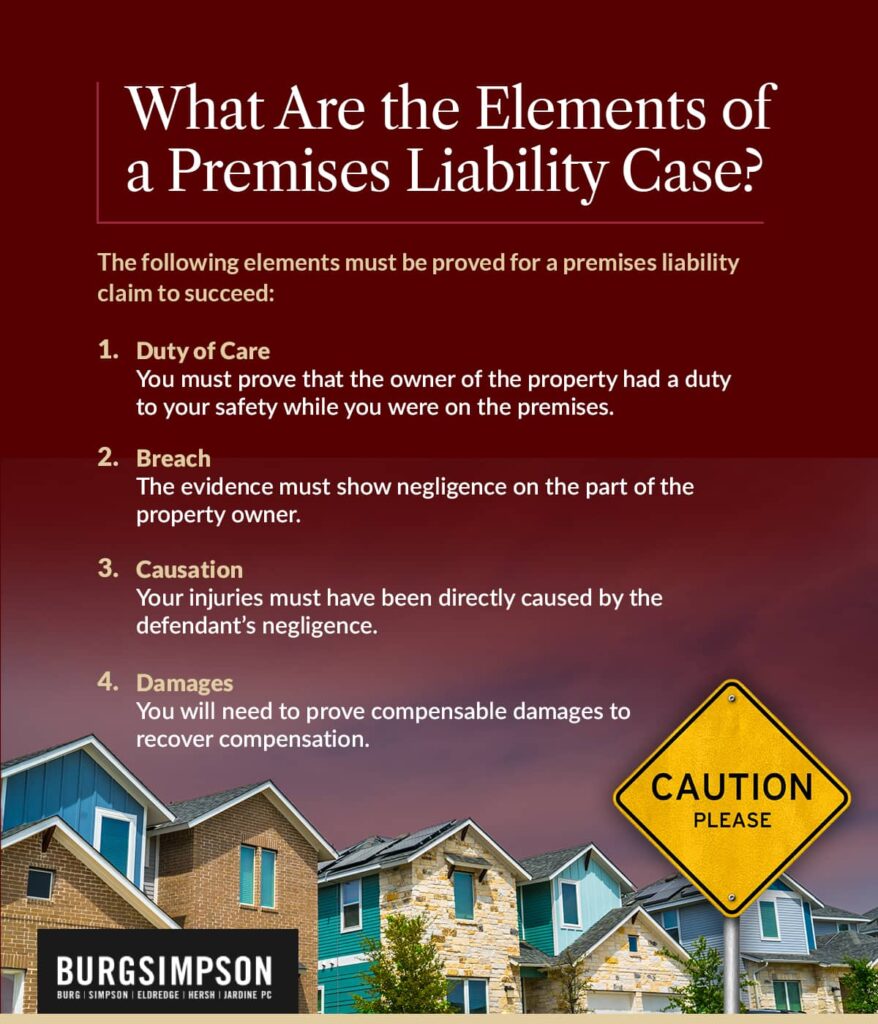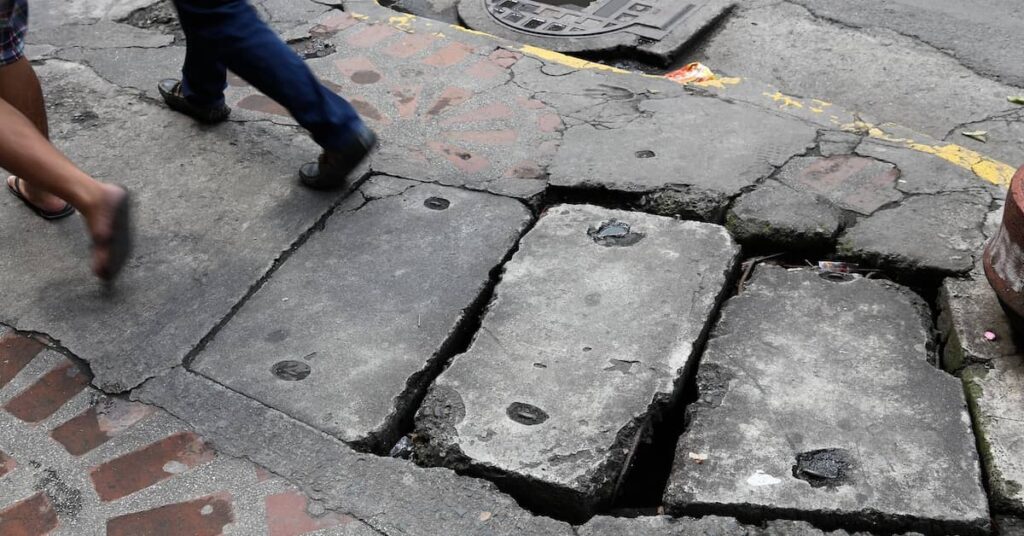Premises Liability Attorneys Serving Denver & All of Colorado
A premises liability lawyer at Burg Simpson Law Firm can help you pursue compensation if you were injured on someone else’s property. Our premises liability attorneys represent clients who have suffered injuries on residential properties, commercial properties, and government properties, including:
- Private homes
- Apartments and condos
- Retail stores and shopping malls
- Parking lots, garages, and parking structures
- Bars and restaurants
- Hotels, resorts, and amusement parks
- Swimming pools and water parks
- Office buildings
- Public parks and recreation areas
- Schools, colleges, and universities
- Municipal and state properties
- And more
Burg Simpson is an elite personal injury law firm. We have an in-depth understanding of the injuries that can occur when property owners fail to maintain and secure their premises. Our premises liability lawyers strive to hold property owners accountable for negligence and obtain maximum compensation on behalf of our clients.
View Our Results
For a FREE and confidential case evaluation, call Burg Simpson at 303-792-5595 today. Our premises liability lawyers serve clients in Denver, Englewood, and throughout Colorado.

What Is Premises Liability Law?
Premises liability law protects the rights of people who are injured on another’s property. It provides legal recourse for injured individuals to recover fair compensation for the injuries and damages they sustain.
As with most personal injury claims, liability is imposed on a property owner when their negligence causes harm to a lawful visitor. Visitors to a property fall into three separate legal categories:
- Invitee: An invitee is someone who (a) has been expressly or implicitly invited onto the premises, or (b) enters the premises to “transact business in which the parties are mutually interested” (see Colorado Revised Statutes (C.R.S.) § 13-21-115, also known as the Colorado Premises Liability Act). Property owners have a duty to protect invitees not only from hazards the owner is aware of, but dangers the owner should have been aware of through the exercise of reasonable care.
- Licensee: A licensee is defined as a “person who enters or remains on the land of another for the licensee’s own convenience or to advance the licensee’s own interests” (see C.R.S. § 13-21-115(7)(c)). Social guests are considered licensees. The property owner may be held liable for injuries and damages caused by (a) hazards on the premises that the owner had actual knowledge of, or (b) a failure to warn licensees of known dangers, if the owner is not usually present on the premises.
- Trespasser: A trespasser is someone who enters the premises without the permission of the owner. Trespassers may only recover damages for injuries caused by willful or deliberate actions on the owner’s part.
The legal status of the plaintiff determines the standard for when damages may be recovered in a premises liability action. Premises liability law can be difficult for the average individual to understand on their own, so it is crucial to speak with a knowledgeable premises liability attorney as soon as possible.
What Must the Injured Party Prove to Win a Premises Liability Case?
An experienced premises liability lawyer will review your case FREE of charge and in the utmost confidence. This initial consultation provides you an opportunity to explore your legal rights and options.
The following elements must be proved for a premises liability claim to succeed:
- Duty of care: You must prove that the owner of the property had a duty to your safety while you were on the premises. The applicable duty of care depends on the plaintiff’s legal classification (see above).
- Breach: The evidence must show negligence on the part of the property owner. Premises liability law often defines negligence as an “unreasonable failure to exercise reasonable care.” What constitutes “reasonable care” depends on the type of property, its accessibility to the public, and other factors.
- Causation: Your injuries must have been directly caused by the defendant’s negligence.
- Damages: Finally, you will need to prove compensable damages to recover compensation for your injuries.
Satisfying each of these elements on your own can be difficult. Burg Simpson has the experience, local knowledge, and resources to prepare a strong case on your behalf and fight for the compensation you deserve.
What Responsibilities Do Property Owners Have?
The exact duties of a property owner or the party in control of the premises depend on how the property is used, the activities of lawful visitors and occupants, and other factors. Generally speaking, property owners have the following responsibilities:
- Maintaining safe conditions: This includes addressing hazards promptly, such as repairing broken steps, fixing faulty wiring, and removing debris or snow and ice from walkways.
- Regular inspections: Property owners should conduct regular inspections to identify and address potential hazards. This includes checking for loose handrails, slippery surfaces, and other dangers.
- Proper maintenance and repairs: Regular maintenance and repairs are essential for preventing hazards such as damaged flooring, objects falling from heights, etc.
- Warning signs: When a hazardous condition cannot be immediately fixed, property owners should provide adequate warning to visitors. This may involve using warning signs, cones, and/or barricades to alert people to potential dangers.
- Security measures: In certain cases, property owners may be responsible for providing adequate security measures to protect visitors from foreseeable criminal activities. This may include proper lighting, surveillance cameras, and security personnel.
- Compliance with building codes: Property owners should ensure their premises comply with applicable building codes and safety regulations. This includes following guidelines related to fire safety, accessibility, and structural integrity.
- Duty to children: Property owners often have a heightened duty of care when children are likely to be present on the property. This includes taking extra precautions to protect children from hazards, such as installing proper fencing around swimming pools.
Failure to uphold these responsibilities exposes owners to liability for injuries sustained by visitors. The best way to find out if you have a claim is to consult a premises liability attorney right away.

Types of Premises Liability Cases
We handle a wide range of premises liability claims on behalf of clients in the Denver area and throughout Colorado. These include:
- Slip and fall accidents
- Negligent security
- Dog bites
- Explosions and fires
- Swimming pool injuries and drownings
- Construction site accidents
- Sexual abuse and assault
- Carbon monoxide poisoning
- Elevator and escalator accidents
- Nursing home abuse and neglect
- Daycare negligence
Any number of dangerous conditions on a property can lead to personal injury or wrongful death. From slippery floors to cracked sidewalks to building code violations and absent security measures, a premises liability lawyer will doggedly collect evidence to ensure that the property owner is held accountable.
Why Choose Burg Simpson?
How Do I Prove Negligence?
If possible, you should try to collect evidence of the danger that caused your injuries before leaving the premises. This may involve taking photos, speaking to witnesses, etc. Unfortunately, your injuries may prevent you from gathering the evidence you need for your claim.
We strongly suggest speaking to a Denver premises liability lawyer. At the initial consultation, we will discuss where the accident occurred, what caused it, whether anyone saw you get hurt, and more. Our attorneys will then investigate thoroughly to assess whether the property owner and/or any other parties were negligent. This process generally involves:
- Taking photos of the premises where the accident took place
- Identifying and speaking to eyewitnesses
- Reviewing any and all incident reports, including records maintained by the property owner, police reports (if applicable), etc.
- Obtaining any available video footage of the accident
- Evaluating maintenance and safety records for the property
- Comparing applicable building codes, safety regulations, professional standards, etc. to conditions on the premises
- Reviewing prior complaints against the owner or operator of the property
- Hiring expert witnesses to provide testimony
Proving negligence in a premises liability claim requires an in-depth knowledge of legal principles and a sophisticated understanding of the evidence needed to prevail. Some of this evidence may be collected by plaintiffs immediately following the incident, but there is no substitute for the support a premises liability attorney can provide.
The Role of Comparative Negligence
Comparative negligence is a legal principle used to determine the degree of fault and liability each party bears for an incident or injury. Modified comparative negligence is the standard used in Colorado. It states that plaintiffs are not barred from compensation as long as any negligence attributable to them is less than the negligence of the defendant(s).
The court is responsible for determining liability and assigning a percentage of fault to the parties involved. If the plaintiff is found to be partly at fault for the injury, any damages will be reduced “in proportion to the amount of negligence attributable to the person for whose injury, damage, or death recovery is made” (see C.R.S. § 13-21-111).
Comparative negligence is a common issue in premises liability claims. Property owners and their insurers will often try to argue that the plaintiff contributed to—or is entirely responsible for—their injuries through carelessness.
For example, say you trip and fall on a crack in the sidewalk. The owner of the premises is responsible for keeping the walks in safe condition, but part of the reason you fell is because you were looking at your phone while walking. In this situation, the court may assign some percentage of negligence to you as well as the owner. Whether you are entitled to compensation depends on who is found to be more responsible for the fall.
It is important not to trust comparative negligence arguments implicitly. Just because the defendant or insurer says you are to blame does not make it true. A premises liability lawyer can review the evidence and preserve your right to damages.

What Is the Most Common Premises Liability Injury?
Dangers on a property can lead to a host of different injuries. Sometimes the injuries are minor and heal with time, while others can result in serious, long-term—or even permanent—effects. It can be difficult to know how severe your injuries are after a fall or other accident on someone’s property, which is why you should seek medical attention as soon as possible.
Common injuries our lawyers see in premises liability claims include:
- Traumatic brain injuries
- Bone fractures
- Soft tissue injuries
- Neck, back, and spinal cord injuries
- Internal injuries
- Nerve damage
- Burn injuries
- Drownings
- Loss of limbs and amputation injuries
- Post-traumatic stress and other psychological injuries
Burg Simpson Law Firm is principally focused on representing individuals who suffer catastrophic injuries through no fault of their own. We also serve families who have lost a loved one due to the negligence and wrongdoing of others.
Some law firms are focused solely on relatively straightforward premises liability cases, such as slip-and-falls and trip-and-falls. Our attorneys handle these, too, but we also take on more complex matters where multiple defendants may be held responsible for our clients’ losses.
As award-winning personal injury lawyers, we pride ourselves on identifying and pursuing all available legal options. This approach has solidified our reputation for aggressive and effective litigation in premises liability matters and other accident claims.
What Is the Statute of Limitations for Premises Liability?
Premises liability is part of personal injury law. As such, a premises liability claim is subject to the same time limit (known as the statute of limitations) as a personal injury case.
In Colorado, the statute of limitations for general personal injury claims is 2 years from the date the accident occurred. Wrongful death claims are subject to the same 2-year time limit.
Once the statute of limitations expires, you will lose the right to file a lawsuit. Although it is not always necessary to file a lawsuit when bringing a premises liability action (most personal injury cases are settled out of court), preserving your legal rights is paramount.
We encourage you to contact Burg Simpson as soon as possible. Our premises liability lawyers will ensure that settlement negotiations and any necessary litigation are pursued promptly. If a lawsuit is filed and your case proceeds to trial, our attorneys have the extensive experience needed to represent you effectively in court.
Compensation in a Premises Liability Claim
You may be entitled to substantial compensation for injuries sustained in a premises liability accident. Burg Simpson Law Firm takes the time to get to know your case, with an emphasis on the nature and severity of your injuries and how they have affected your life. This knowledge enables us to advocate for maximum compensation on your behalf.
A Denver premises liability lawyer can pursue recovery of the following damages:
- Previous medical expenses, including the cost of ambulance services, emergency room and hospital care, surgery, etc.
- Lost income
- Ongoing and future medical expenses, including medications, assistive devices, rehabilitation and therapy, counseling, home-based care, etc.
- Loss of earning capacity
- The cost of modifying your home or vehicle
- Pain and suffering
- Loss of enjoyment of life
- Permanent disability
- Scarring and disfigurement
- Loss of consortium
Exemplary damages (also called punitive damages) may be awarded if the court finds that the defendant’s actions were “attended by circumstances of fraud, malice, or willful and wanton conduct” (see C.R.S. § 13-21-102). This is a high bar, but it may be worth pursuing these additional damages at trial as a means of recovering additional compensation and potentially preventing incidents like yours from happening to someone else.
Contact a Denver Premises Liability Lawyer Today
Burg Simpson was founded in 1976. For more than 45 years, we have built a sterling reputation as advocates for the wrongfully injured. Our experience encompasses a wide range of scenarios, including injuries sustained on unsafe properties.
We are Good Lawyers. Changing Lives®. This is evident not only in the more than $2 billion we have recovered for our clients, but in the hands-on guidance and empathetic support we provide to every individual who entrusts us with their case.
Properties are often owned by major corporations. In the event of an injury or incident on the premises, most property owners are represented by massive insurance companies. We are not afraid to go up against large and powerful defendants and their insurers. Our firm combines in-depth local knowledge with the resources and clout of a nationwide law firm to provide the highest standard of legal service.
Talk to a premises liability lawyer about your case for FREE today. Call 303-792-5595 to get started.





